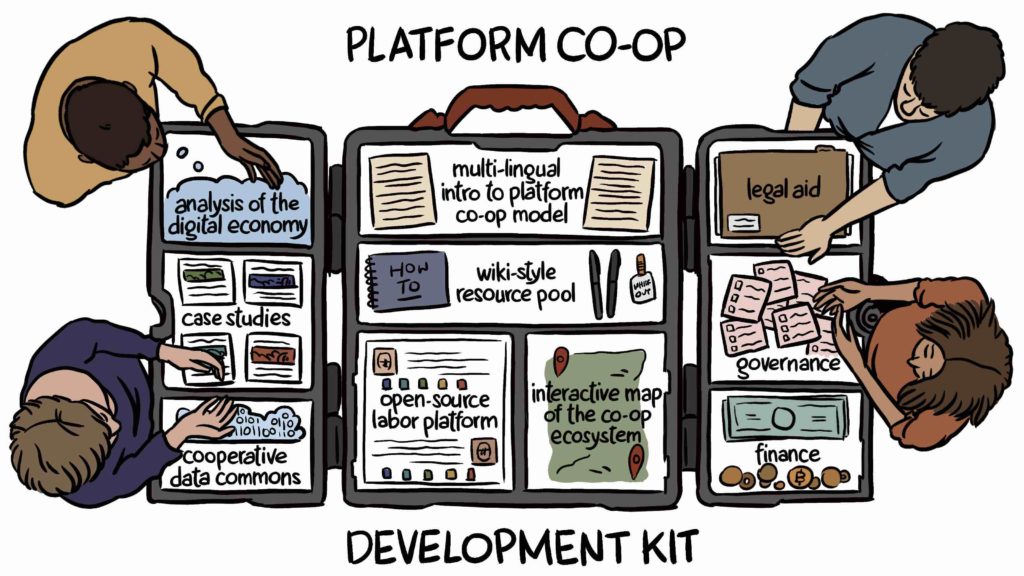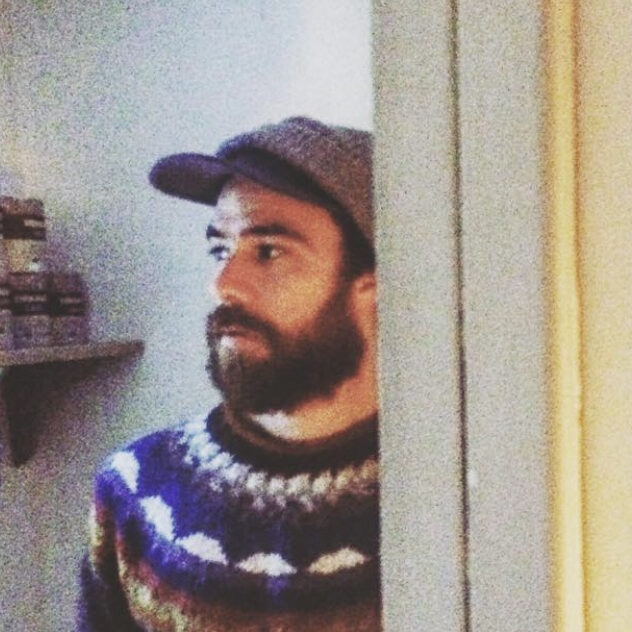The state of precarity inherent to most forms of digital labor and the unchecked exploitation of workers on many gig economy platforms is a largely under covered issue. Although there are some conversations around regulating companies that perpertrate such practices, issues of ownership and governance as they relate to questionable practices of various digital platforms are rarely given much consideration. But this is beginning to change with the rise in what is known as the platform cooperative movement, a broad network of individuals and organizations pushing to bring the values of cooperative ownership, governance, and management, into the digital labor landscape.
Trebor Scholz is an associate professor of culture and media at The New School in New York City, New York, and chair of the conference series "The Politics of Digital Culture." He's been an advocate of the platform cooperativism movement for many years and launched the Platform Cooperativism Consortium (Shareable is part of the Consortium), which was awarded a $1 million dollar grant from Google.org, this week. The grant "focuses specifically on creating a critical analysis of the digital economy, and designing open source tools that will support platform co-ops working in sectors such as child care, elder care, home services, and recycling in the United States, Brazil, Australia, Germany, and India," according to a press release by The New School. "This grant is a big win for the cooperative movement and for platform co-op pioneers all over the world," Scholz said in a statement. "This Kit will make it easier to start and run platform co-ops. It will also provide an interactive map of the co-op ecosystem and essential community-edited resources." We talked to Scholz as he was working on the project about the potential of platform cooperatives in addressing many of the challenges in the digital world today.
Robert Raymond, Shareable: You are in the process of launching an ambitious project around strengthening and spreading the platform cooperative movement. The project consists of many different elements and is structured as a kind of development kit for platform co-ops. I'll let you tell us all about it in just a second, but first, can you explain what a platform cooperative is, and what problem or challenge they are addressing?
Trebor Scholz, associate professor of culture and media at The New School: Platform co-ops are really about the broad-based ownership and democratic governance of digital platforms. So, imagine that Uber is owned by its drivers, or something like TaskRabbit is owned and operated by the workers. Or, in Europe, that Deliveroo is operated by the couriers and owned by the couriers. What this model leads to is a fair pay and a higher quality of work,so there is a dignity that you will not get in the extractive sharing economy. Also, the research on worker cooperatives shows that they are actually more productive than traditional businesses.
There are all sorts of economic and tax advantages as well. So think about something like AirBnb. You might be staying at an AirBnb in Amsterdam, or Barcelona, and much of the money spent at that Airbnb is taken out of the community, and the revenue doesn't go through taxes into your local community, but is transferred instead right to Silicon Valley. On top of that there are all of the illegal operations of platforms like Uber and Lyft. It’s been proven, with the recent study from MIT, that these businesses contribute to a congestion of cities.
So, what the platform cooperativism movement is pushing back against is what I would sum up as a broken social contract. There are unsustainably low wages, compromised data and privacy, edge populations that aren't considered in the design — so it's a sort of big ego design, a waterfall design of Silicon Valley that pushes software onto people instead of co-designing it. There's a shift away from direct employment which means a loss of worker voice and rights and benefits and of course centralized data ownership. The intellectual North Star for the alternative of the platform co-op model is really democratic governance, broad-based platform ownership.
So, tell us a bit about the Development Kit project.
The first part of the project is just to explain what is actually the problem with a business model like Lyft and many of these other companies, TaskRabbit, Deliveroo — what's actually the problem? So that's part of it, because I think it's very important to actually change people's mindsets about that.
Once they are convinced and are interested in actually changing it, they can see this whole ecosystem that already exists. So we are building a map that will have a lot of information about all of these cooperative platform businesses, some 240, that already exist, and then we will invite people to participate themselves. We are working at the Harvard Business Law School on a platform co-op legal clinic that is starting to get at the legal issues that exist in starting platform co-ops specifically, not just co-ops but platform co-ops,and trying to get these legal issues out of the way.
My initial idea was to somehow perhaps automate this, so that you can click and create a platform co-op, almost like a click-through legal contract. But that seems to be quite unlikely to happen because there are just way too many different co-op laws in the United States. But you know, why is it that you can't just do something similar to what corporations do in Delaware, for example? You know, the vast majority of corporations in the U.S. actually incorporate in the state of Delaware. It's an example of how one model in one state can work for all corporations. A centralized model. Why wouldn't that be possible for cooperatives as well — just to make it simple?
The second thing is that we are starting an international network of lawyers through the Harvard network so that you could basically have lawyers in many countries where platform co-ops emerge that could help them to get the legal issues out of the way.
Another thing is that we are trying to address issues of governance. We're trying to co-create and co-design, in direct collaboration with the co-ops themselves, a model where co-op members can use the platform to have a voice in the co-op itself. We are working with a group in India, for example, where the women are really dispersed all over the state of Gujarat. And so they have a hard time actually being meaningful members of the co-op, and so we tried to change that.
The third thing is an open source labor platform. So, basically something that can be customized for various users. So anyone trying to build one only needs a small amount of money to be able to start a platform like that. And yeah, so these are just some of the many things we are working on co-designing as part of this project.
And so it sounds like the idea of co-designing, of co-creating this toolkit, in a collaborative and participatory way plays a central role in this project?
That's right. This needs to be opened up to the whole community — like to really activate the community around it and really do this with the community and not just for the community.That's the idea. I'd like to really activate groups and really work with people, alongside people, and do it with them. I think that's the way to go. And yeah, the project starts in July and will run for two years. After which, of course, we hope to get more funding and also try to engage other foundations to build on this. We are laying the technical foundations now, and there will be all of this infrastructure that will exist, that will be built, and the hope is that now others can come in and say, "Can you do this in Georgia, can you do this in Ohio?" You name it.
Can you describe some of the projects, some of the communities that you are working with or hoping to work with?
There are babysitters in Illinois, for example, that were organized by the union, and now we are coming in and adding an onboarding tool for them and maybe helping with a labor platform. And then there are these women in Ahmedabad, India, that I mentioned earlier, who we are working with to bring beauty services to people's houses — like a platform service for doing hair and makeup, you know. So they are training twenty-seven women right now and in the fall it will be seventy-five, and then it will grow from there. And they are already all organized in a co-op and they will basically bring this sort of service to urban, young professionals.
There are many other projects. We talked to these 2,000 Uber drivers in Cape Town who wanted to drop out and start a platform co-op, we talked with trash pickers in the informal economy in Cairo, Egypt. There is no trash collection there and so through the Coptic Church these people get organized and want to start a platform where people can order trash pick-ups from them, and they would get paid for them. All these very, very diverse applications.
What is your ultimate dream for this project?
Well the project itself is much bigger than what we have right now. So, the goal is really to go into what we call "pull markets" — so markets where you don't need so much marketing. For example, social care. There you see basically what we are doing, what we're addressing, and then also what is not funded, you know? The dream is basically like a full-cycle implementation of this model in various territories. So we have projects that we could do in Brazil, and Colombia with refugees, in Germany, and you know all over the place. It's very exciting.
This Q&A has been edited for length and clarity.
Header illustration by Susie Cagle









